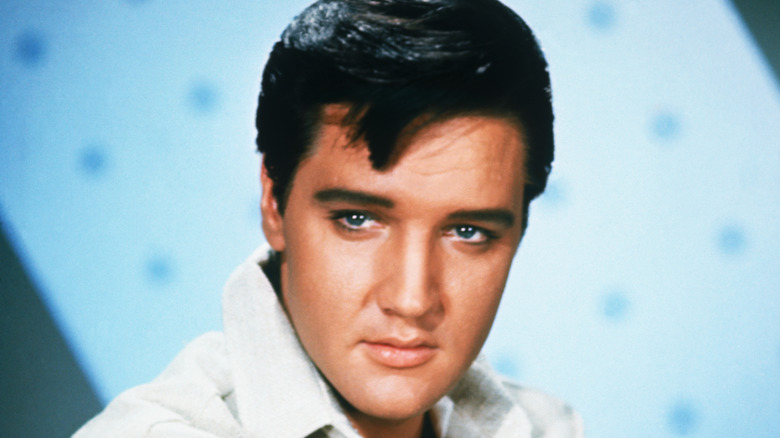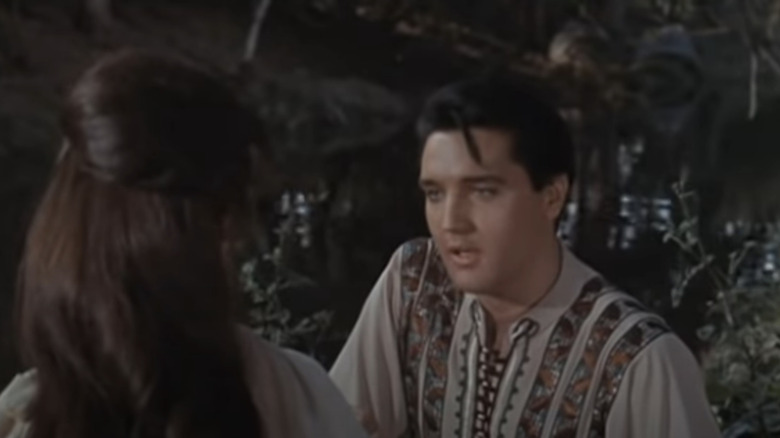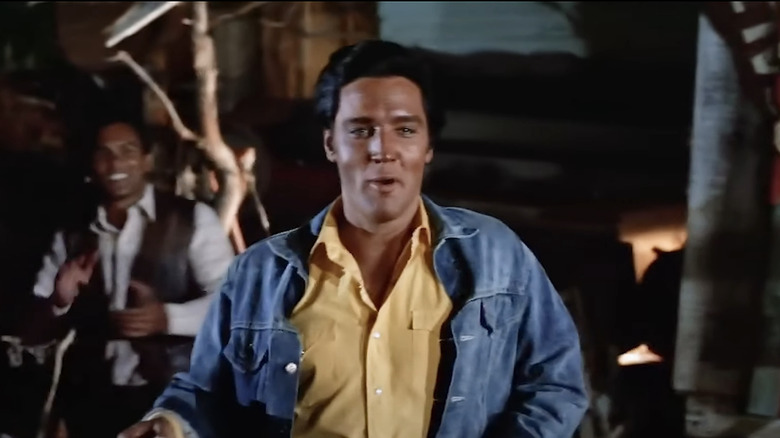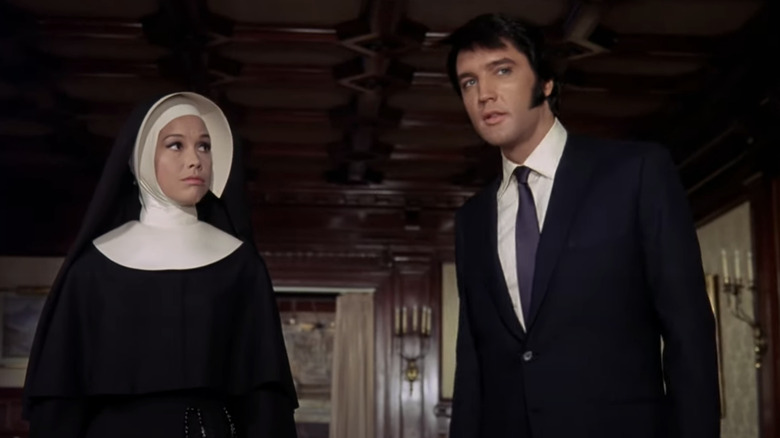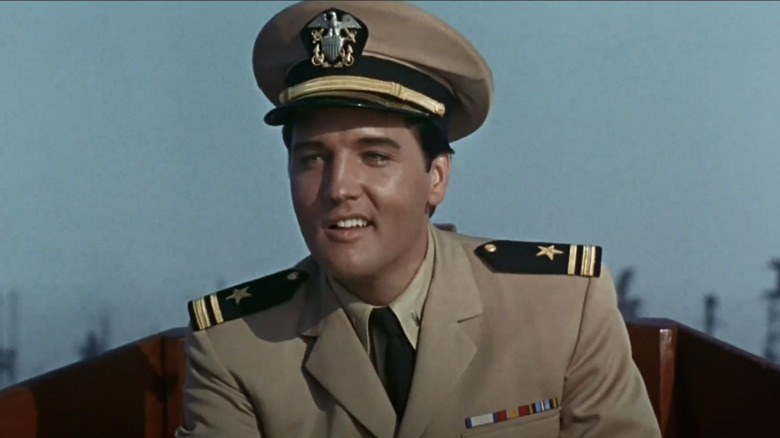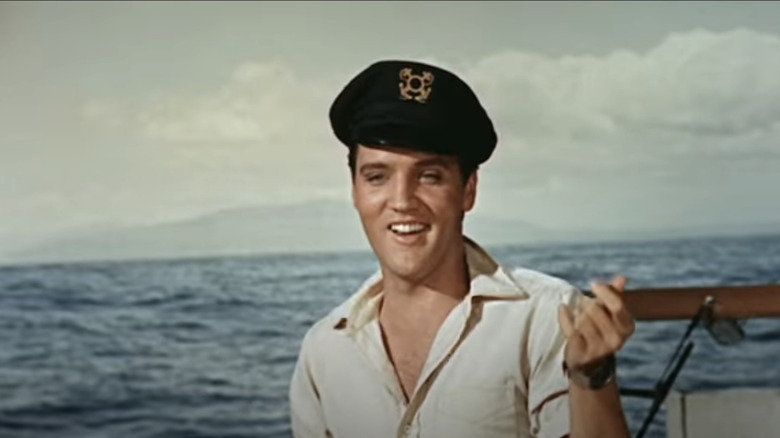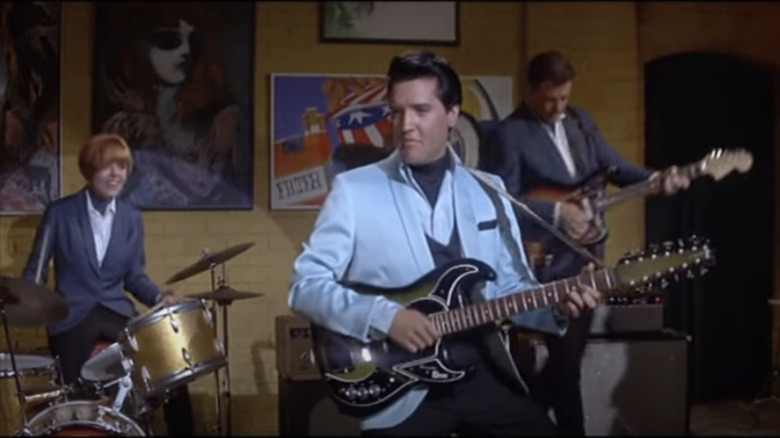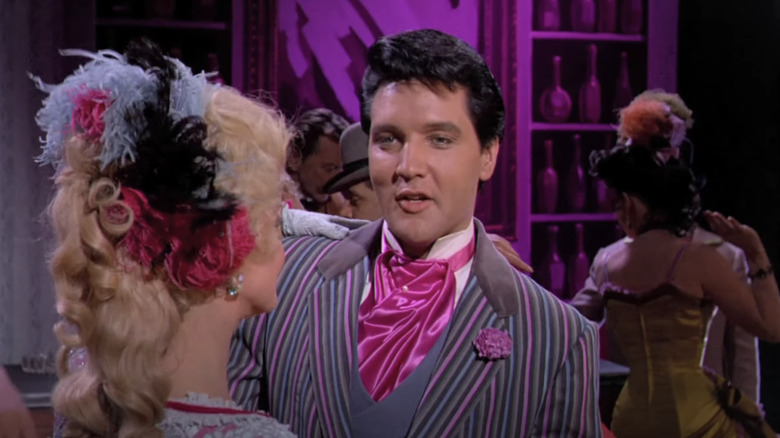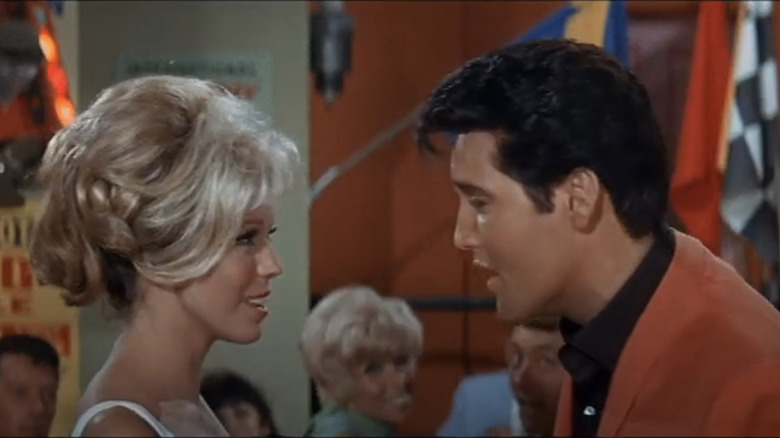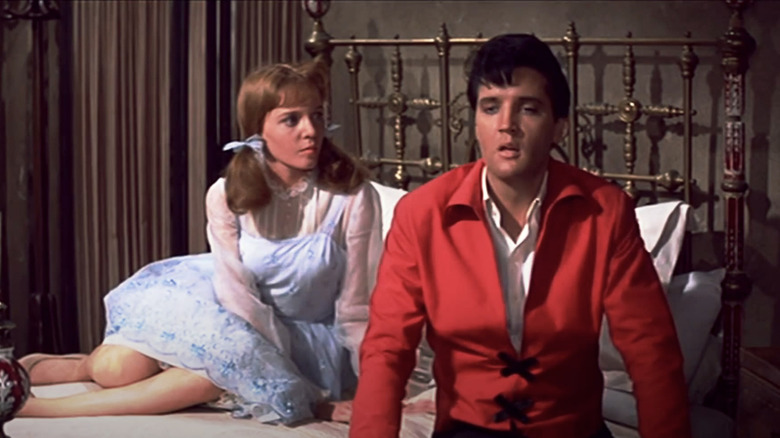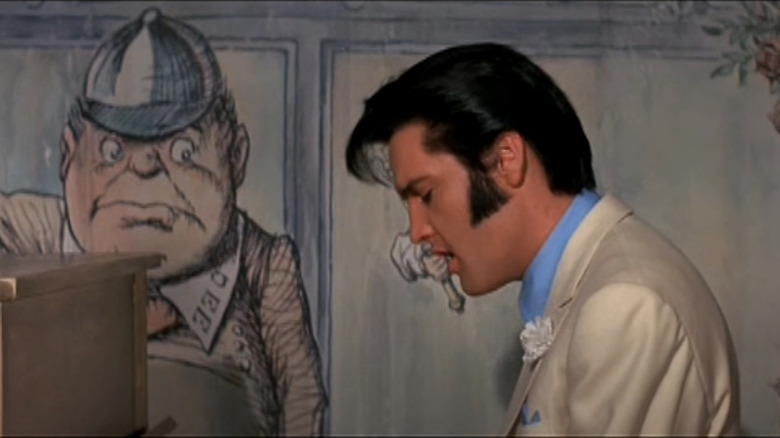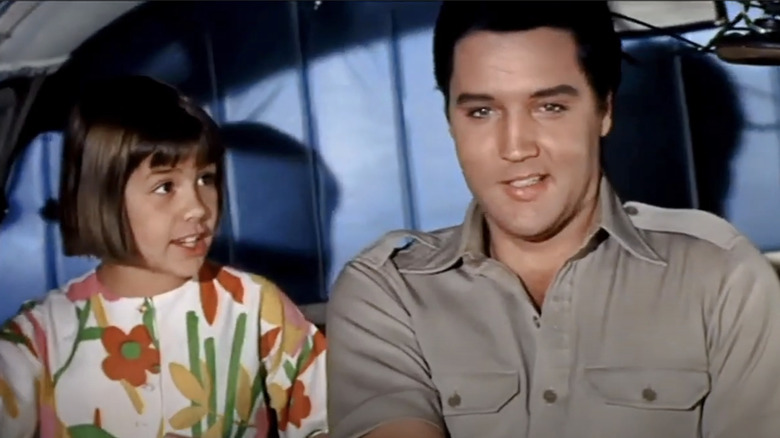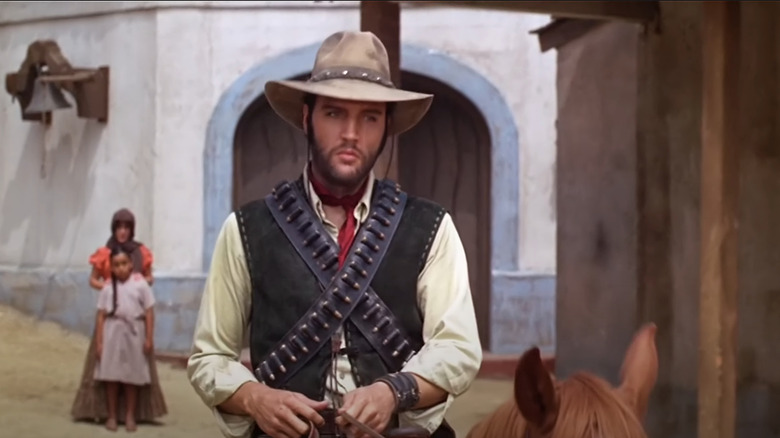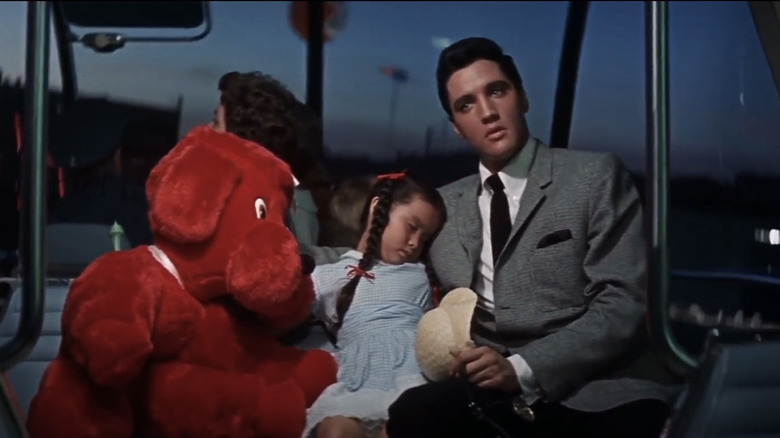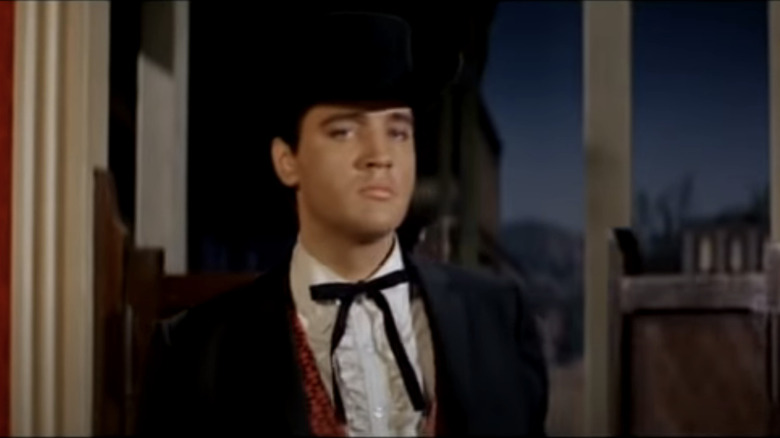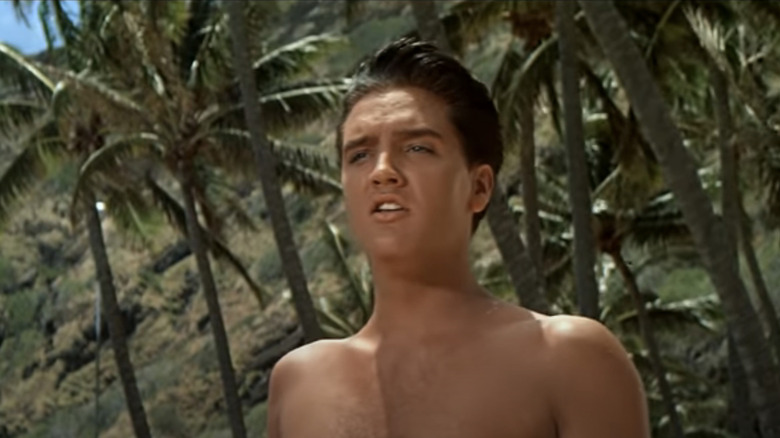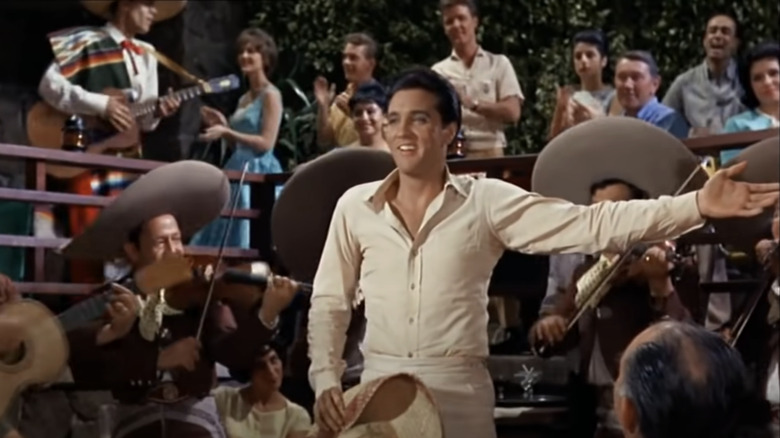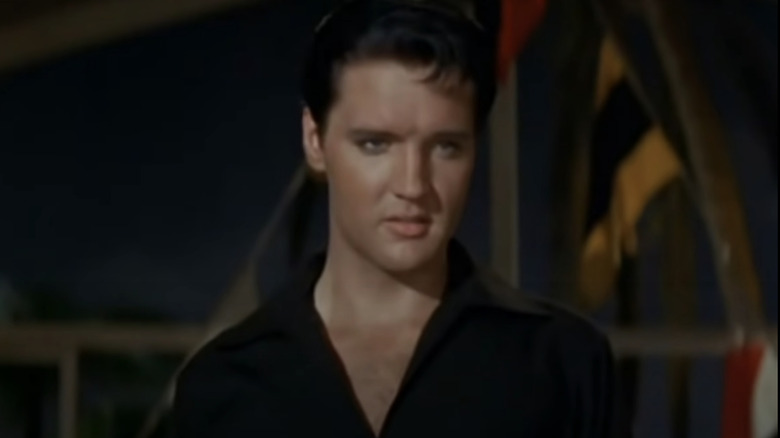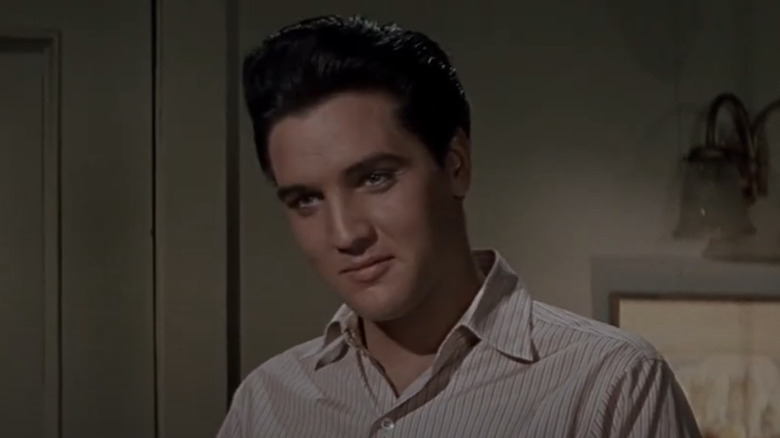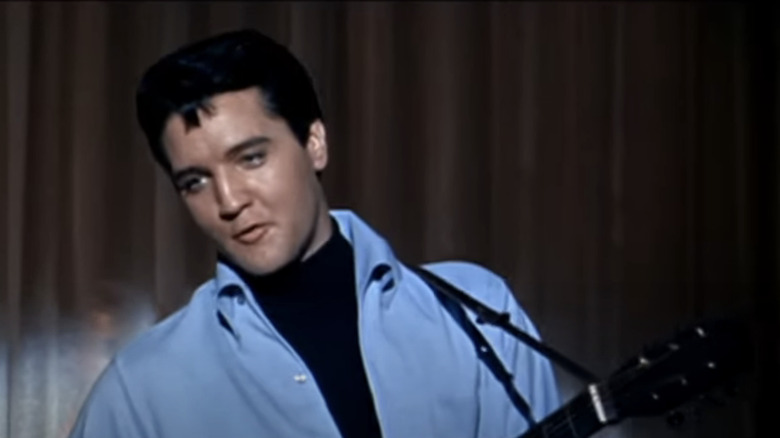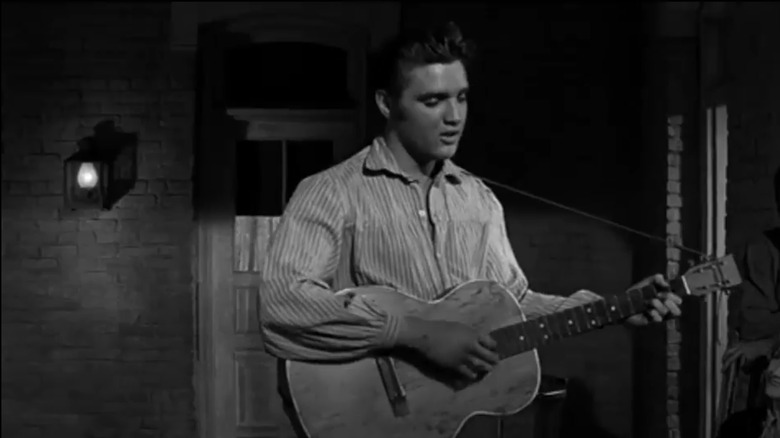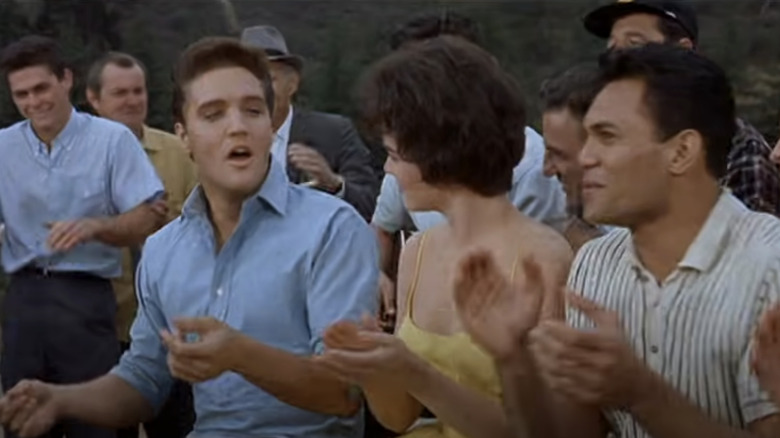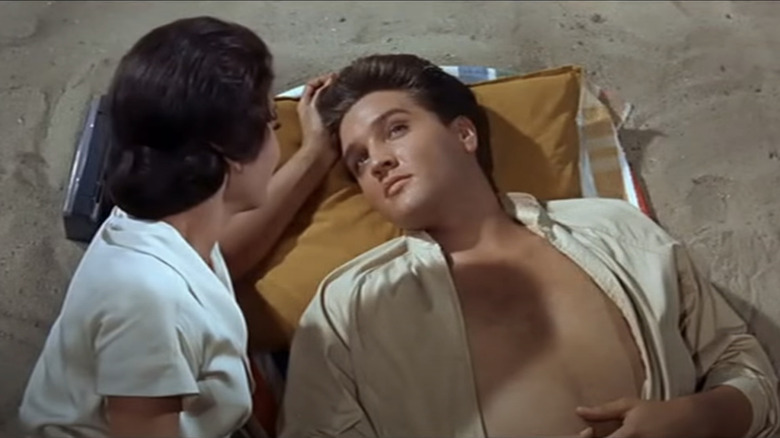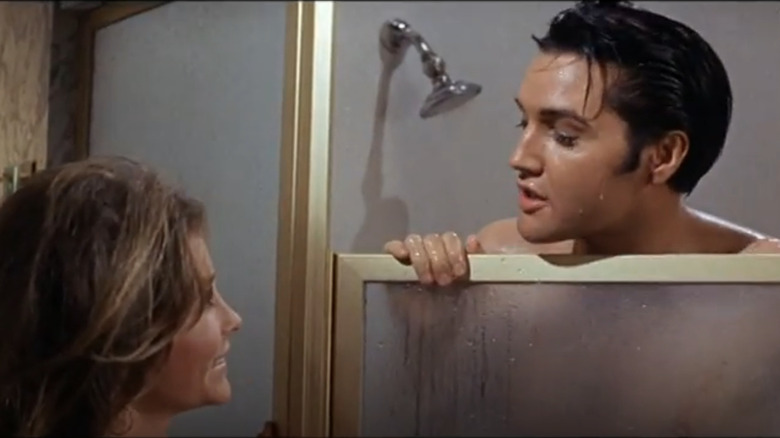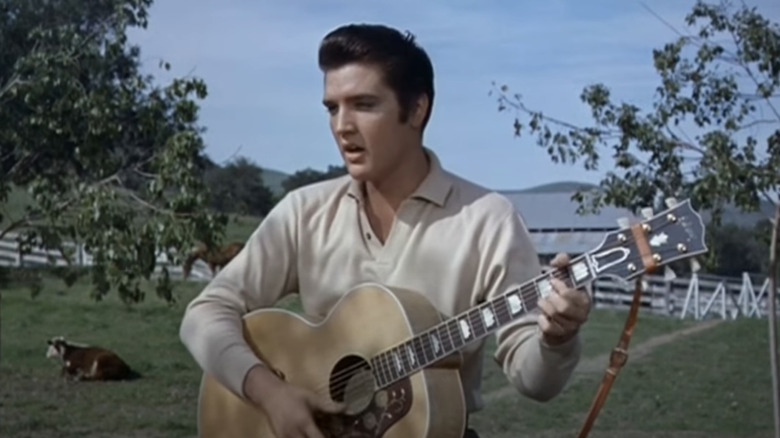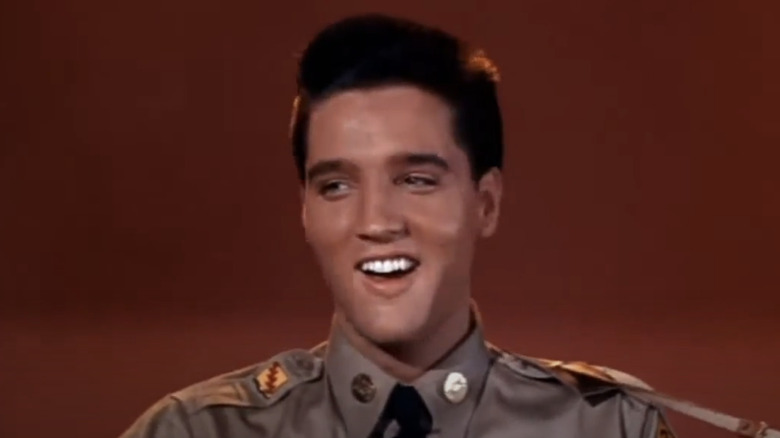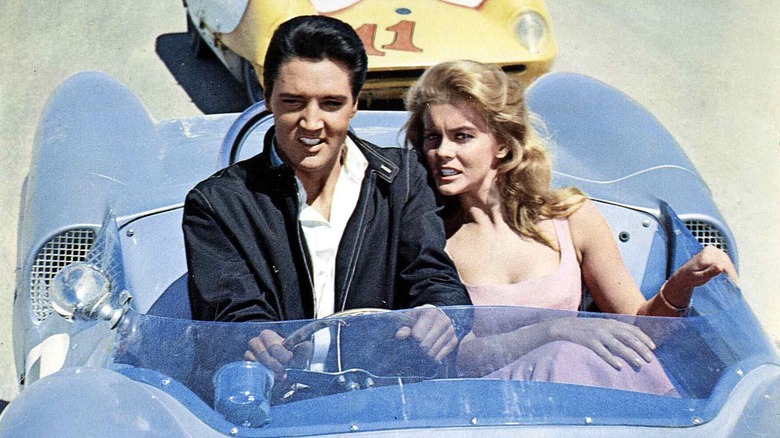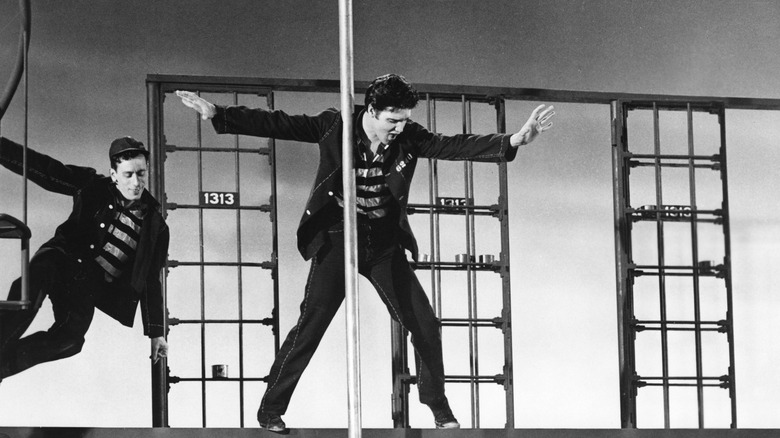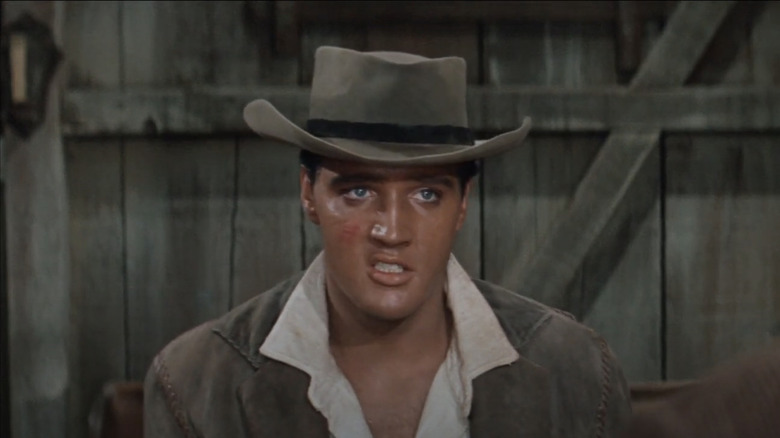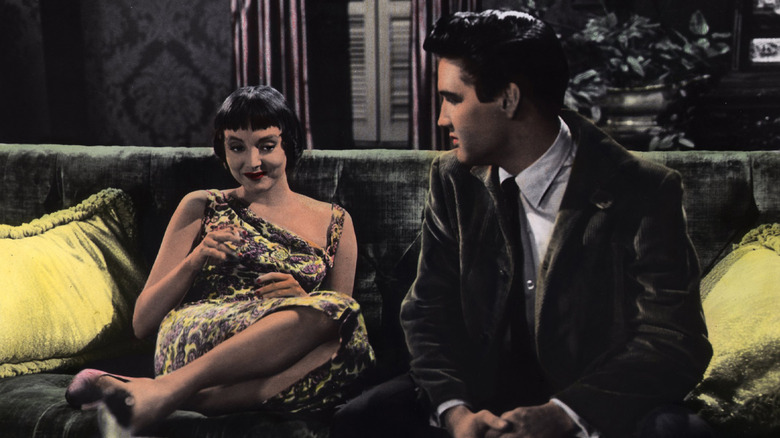Elvis Movies Ranked Worst To Best
The "Elvis movie" was a unique phenomenon; there was nothing really like it before, or even since. Of course, pop music stars and film had gone hand in hand since the advent of talkies, from the feature-length musicals of Bing Crosby and Lena Horne to proto-music videos starring bandleaders Louis Jordan and Cab Calloway. And plenty of singers in the years after Elvis Presley's last film have starred in movie musicals or straight films where their songs were prominently placed on the soundtrack: Barbra Streisand, Madonna, Britney Spears, Kelly Clarkson and Justin Guarini. But Horne and Streisand never pumped out three movies a year for more than a decade, and Crosby's busiest years were in the golden age of the movie musical. Frankie and Annette made a few beach party flicks in the 1960s, and The Beatles had their own post-modern takes on the Elvis movie, but as he often did, The King stood alone.
Presley's films, to be fair, were rarely critical favorites, and at the rate in which they were pumped out — 31 films in just over a dozen years -– some corners had to be cut, particularly in the screenplay department. Most of the films cast Presley as a well-intentioned hunk with a two-fisted job like cowboy, soldier, or race car driver. His rowdy ways are challenged by the love of a good woman, and he sings a song or two that would become chart-topping hits. Despite this staid format, the movies remained massively popular, and made Elvis the highest-paid actor of his day. In a tumultuous decade, you couldn't count on much in the world, but you could count on an Elvis movie. Here are Elvis' 31 starring roles, ranked from worst to best.
31. Harum Scarum
It's romance, action, and a script full of borderline offensive stereotypes in 1965's "Harum Scarum." Presley plays the very Presley-like Johnny Tyronne, a singer and movie star promoting his latest project in an unnamed Middle Eastern country. After falling for a beautiful rebel (Fran Jeffries), Johnny finds himself ensnared in an assassination plot against the local king (Phillip Reed), whose lovely daughter (Mary Ann Mobley) is soon competing for Johnny's affections.
Though the film reunited Presley with his "Kissin' Cousins" director Gene Nelson and producer Sam Katzman, it was by all accounts a rushed, slapdash production, as chronicled in Peter Guralnick's book "Careless Love: The Unmaking of Elvis Presley." Presley was particularly disappointed that what he had hoped to be a dashing homage to the exotic romance films of Rudolph Valentino turned out to be a hokey spoof. And the film's vision of a still-medieval Middle East full of harem girls, palace guards with scimitars, white actors in brownface, and a wily dwarf pickpocket named Baba (Billy Barty) — hoary clichés even in 1965 — has aged like warm milk.
30. Stay Away, Joe
It's never a good sign when a film's title can double as its own bad review. Such is the case with 1968's "Stay Away, Joe," a warning that audiences should have heeded. Presley plays the eponymous Joe, a modern-day cowboy whose life is one big party, jumping between rodeos, cattle drives, and women one after the next. It could have been just another lightweight trifle like so many other Elvis movies, if not for the fact that Joe and his family are supposed to be Navajo, and Presley, Burgess Meredith (playing his father), and several other white actors are slathered in redface. This was already egregiously offensive in 1968, the same year that saw the formation of the American Indian Movement, and is borderline unwatchable today.
In the film's slight defense, Michael A. Hoey's script (based on a novel by Dan Cushman) attempts to depict contemporary reservation life for Indigenous peoples, but any sensitivity is buried under layers of crude makeup and painfully unfunny hijinks, such as the running gag of the local saloon keeper (Joan Blondell) gunning after Joe for seducing her teenage daughter. There isn't even much music to distract from the story; Presley recorded just three songs for the film that wound up on compilation albums over the next few years, as a proper soundtrack was never released.
29. Change of Habit
It's sadly rare for any performer to go out on top, for their last work and their best work to be one and the same. The King proved no exception to this rule in his final film, 1969's "Change of Habit." The film was intended to be something new for Presley, an urban drama with something resembling a message, and an acting challenge to boot. In order to play a sensitive, idealistic doctor tending to impoverished patients on the mean streets of New York, Presley worked with the film's director William A. Graham, who had studied under famed acting teacher Sanford Meisner.
According to Peter Guralnick's authoritative biography "Careless Love," Presley was a quick study and took to the Meisner Technique well, but in service to what ended up being another goofy (if well-meaning) Elvis movie. Presley's Dr. John Carpenter may be a caring man of science, but he's just as quick with his fists and with a song as any of the other heroes in his 30 preceding films, romancing Mary Tyler Moore (as a nun in disguise, hence the film's punny title) and singing "Rubberneckin'," which made it to number six on the Billboard Hot 100. Still, it's poignant to see Presley commit to what would be his final film performance. Soon after the film's release he would begin the Las Vegas residency that made up the final act of his career; one wonders what he might have done in film in the 1970s.
28. Easy Come Easy Go
Originally conceived as a project for the surf rock duo Jan and Dean (per The American Film Institute), 1967's "Easy Come, Easy Go" stars Presley as a recently retired Navy frogman and part-time nightclub singer on the hunt for sunken treasure. Aiding him in his quest is a feisty go-go dancer (Dodie Marshall) and a salty sea captain played by screen and stage vet Frank McHugh in his final film. In their way is a villainous competitor (Skip Ward) and his femme fatale girlfriend (Pat Priest) who sets her sights on distracting our hero from both the treasure and the nice girl at his side.
The film takes a humorous look at the burgeoning hippie culture, setting Presley's character (and by extension, Presley himself) amongst groovy chicks in body paint, student protesters, and a disastrous yoga class. This leads to the most notable, and surreal, moment in an otherwise generic film, as Presley fumbles his way through various yoga positions while singing the novelty song "Yoga Is as Yoga Does" with the class instructor, played by the Bride of Frankenstein herself Elsa Lanchester.
27. Clambake
Shakespeare meets speedboats in Presley's third release of 1967, "Clambake." The King plays a spoiled Florida oil heir who switches places with a beachside resort's new waterski instructor to see if anyone likes him for who he is, rather than for his money. Along the way he meets a gold digger ("Girl Happy" co-star and fellow '50s icon Shelley Faberes) who is working to seduce a local rich kid (Bill Bixby). It all comes together in a climactic speedboat race; notably, very little of the film has anything to do with the titular clambake.
The film's plot is surprisingly stuffed, with mistaken identities and false declarations of love straight out of "As You Like It" or "Twelfth Night," but Presley appears to have little appetite for any of it, visibly uninterested even in the high-energy musical numbers and capturing little of the chemistry he had with Faberes in "Girl Happy." According to Guralnick's book, he was going through a particularly morbid moment while on set, listening to the same album of sad ballads over and over again. Presley's own soundtrack album produced two singles, "Big Boss Man" and "Guitar Man," but neither charted higher than #28 on the Billboard Hot 100.
26. Girls! Girls! Girls!
Presley and crew returned to Hawaii after the commercial success of "Blue Hawaii" for 1962's "Girls! Girls! Girls!" As simplistic as its title, the film follows suspiciously soft and handsome fisherman Ross Carpenter (Presley) as he pursues his dreams of owning his own commercial fishing boat, while also pursuing nearly every woman on the Big Island and beyond. As with many Elvis movies, he finds himself torn between a fast-talking career gal (Stella Stevens) and a pure-hearted nice girl (Laurel Goodwin).
Though it was nominated for a Golden Globe, the film itself is a step down from Presley's other work of the era. Stevens in particular was offended by the low quality of the script and initially refused to co-star (via Express); Paramount Pictures won her back by promising that her next film would be with Montgomery Clift (though that film, "Too Late Blues," would eventually star Bobby Darin instead). Three songs from the soundtrack were released as singles, though only "Return to Sender" cracked the Hot 100, making it all the way to #2.
25. Kissin' Cousins
Presley pulls double-duty via some pretty good split screen effects and so-so stand-in work in 1964's "Kissin' Cousins," playing straight-laced Army man Josh and his backwoods Tennessee third cousin Jody. When the Army needs to requisition Jody's family mountaintop for a missile site, the brass sends in Josh to help smooth things over. Soon enough he's tussling with Jody and juggling the affections of a pair of comely country cousins (Pamela Austin and Yvonne Craig, a few years before playing Batgirl).
Though the film thankfully avoids the racist overtones of "Harum Scarum" and "Stay Away, Joe," its treatment of Smoky Mountain culture is really no less stereotypical, chock full of pot stills and possum stew, and populated with the same dim-bulb country boys and buxom country girls as seen on "The Beverly Hillbillies" or in "Li'l Abner" comic strips. The film's soundtrack is mostly forgettable; only the title track was released as a single, making it to #12 on the charts. For Elvis completists, though, the film is perhaps most notable for Presley sporting his natural hair color as blond Jody (via Express).
24. Spinout
"Spinout" from 1966 dares to challenge the Elvis movie template by asking, "What if he had three girls after him instead of two?" The subtext to many (if not most) of these films is to flatter and affirm Presley's virility to an absurd degree. Here, he plays Mike McCoy, who's not just a rock and roll singer but also a hotshot race car driver with three different women literally begging to marry him: a spoiled heiress (Shelley Fabares again), a feminist author (Diane McBain) who considers Mike the perfect man, and the tomboyish drummer in Mike's band (Deborah Walley) who's been carrying a torch along with her drumsticks for years.
But Mike can't be tied down by one woman, or even three; in order to continue his carefree bachelor lifestyle of rocking, racing, and ravishing, he plays matchmaker to find his three would-be brides more suitable husbands than he. But can he do all that and win the big race? The answer might (not) surprise you. This subtle tweaking of the Elvis movie formula was perhaps too subtle to make much of a difference; the film trails behind Presley's other two 1966 releases in both quality and reputation, as we'll soon see.
23. Frankie and Johnny
Romance is in the cards in 1966's "Frankie and Johnny," a quasi-adaptation of the old folk song that stars Presley as Johnny, a turn-of-the-century riverboat performer and inveterate gambler, and Donna Douglas as his long-suffering girlfriend/co-star Frankie. After a string of bad nights at the riverboat's casino, a fortune teller predicts that Johnny's luck will change thanks to a mysterious red-haired woman. And wouldn't you know it, Nellie Bly (Nancy Kovack), their boss' mistress, just happens to be a red-haired woman.
The folk song, of course, has Frankie shooting Johnny in a jealous rage over his affair with Nellie Bly, but the film takes a more circuitous, almost postmodern route to that destination, with the two of them acting out this scenario in their stage act, which gets turned into the song that the film is presumably based on. It's all slightly more clever than it needs to be, and the fake-out ending is sure to disappoint anyone interested in seeing Elvis finally die in one of these movies.
22. Speedway
Elvis is back on the racetrack in "Speedway" from 1968, playing Steve Grayson, a good ol' boy who's a demon behind the wheel but a soft touch with his pocketbook. When the IRS sends a stylish revenuer (Nancy Sinatra) to collect back taxes that his crooked manager neglected to pay, Steve risks it all on one last big race at the Charlotte Motor Speedway.
This would be the last of Presley's all-ages musical comedies; his last four films would all attempt in their own ways to introduce The King to the more sophisticated, adult world of New Hollywood. While "Speedway" hardly re-invents the wheel, it does offer more thrills than usual thanks to its real-life stock car racing scenes, with stars of the era like Richard Petty and Cale Yarborough playing themselves. The soundtrack album was a bust, with its one single making it just to #72 on the Billboard Hot 100, though it's notable for having the one song on any Elvis release, Sinatra's "Your Groovy Self," to not feature Presley at all. Roger Ebert's two-star review damns the film with faint praise, finding Sinatra lacking as both a singer and actor.
21. Double Trouble
After taking on the hippies in "Easy Come, Easy Go," Elvis hits up Swinging London in "Double Trouble," released just a few months later in 1967. Presley once again plays the hits as a rock singer caught between two women, one worldly (Yvonne Romain) and the other sheltered (Annette Day), but adds a couple of fun twists in the form of a "Pink Panther"-esque jewel heist subplot and the reasonable recreation of its European locales on a Hollywood backlot. The story goes that Presley's longtime manager Colonel Tom Parker refused to allow him to tour or film outside of the United States, as Parker feared that his own status as an illegal immigrant (or worse crimes) would be exposed and he would be deported.
And like "Easy Come, Easy Go," this was originally a project developed with an entirely different performer in mind. Per The Washington Post, first-time producer Irwin Winkler, who would go on to produce the "Rocky" films and work closely with Martin Scorsese, wanted movie star Julie Christie in the lead until a call from the head of MGM turned this into an Elvis movie in an instant.
20. The Trouble with Girls
1969 marked not just the final year of Presley's film career, but an honest attempt to bring the "Elvis movie" into the modern age, taking inspiration from (or just plain ripping off) the era's significant films. None of his three films from that year were quite successful at that goal, but the second one feels like it should have been a perfect re-introduction for The King, at least on paper. A period piece set in the late 1920s, Presley plays the charismatic manager of a Chautaqua show, a kind of traveling educational carnival that roamed rural America in the first part of the 20th century. The film is still a musical, but most of its songs are presented in the context of tent shows, and director Peter Tewksbury doesn't hide from the darker aspects of life in the 1920s, especially for an itinerant band of entertainers led by a charlatan with a heart of gold.
And the title of such a film? Why, "The Trouble with Girls," naturally. Fearing that no one would understand or be able to pronounce "Chautaqua," MGM chose a title that feels of a piece with Presley's more lighthearted films, but didn't prepare the audience at all for what the movie was actually about. Yes, there are girls and yes, Presley gets in trouble with them; despite its more serious tone, this is still an Elvis movie, and romantic shenanigans still abound. Like "Change of Habit," Presley's performance never quite rises to the occasion, even though the character should have been right in his wheelhouse.
19. Paradise, Hawaiian Style
"Paradise, Hawaiian Style" from 1966 was Presley's third and final trip to Hawaii and is his most polished, a gorgeous, frictionless bauble that might as well have been crafted by the state's tourism board. As helicopter pilot Rick Richards, Presley works to keep his charter business afloat while singing in elaborate musical numbers surrounded by photogenic Hawaiian dancers and rescuing his best friend and business partner Danny (James Shigeta, "Die Hard").
There is the requisite love triangle with Suzannah Leigh and Marianna Hill, but the most important woman in Rick's life is Danny's adorable young daughter Jan, played by Donna Butterworth. There are songs aplenty, though none of them were released as singles. The film grossed well for a latter day Elvis movie, and contemporary reviews praised cinematographer W. Wallace Kelley's lush scenic photography, even as they noted that the plot and characters were so weightless that they didn't even need Rick and Danny's helicopter to float away.
18. Charro!
Sadly not a biopic of the celebrated actress and flamenco guitarist, "Charro!" was another of Presley's attempts at cinematic reinvention in 1969, this time taking aim at Clint Eastwood and the spaghetti westerns that made him a household name. Sporting twin bandoliers and a dark scruffy beard, Presley rides into a sparse Western set as Jess Wade, a reformed outlaw who is then captured, branded, and left for dead by his old gang (led by longtime cowboy actor Victor French), who are holding a small town hostage with a stolen solid gold cannon.
According to Peter Guralnick, Presley was thrilled at the original script, chock full of Eastwood-style sexuality and violence and nary a musical number to be found, then disappointed when he arrived on set and found that the shooting script had been neutered — though still no musical numbers. Presley had played cowboys before, but of the clean-shaven, singing variety; try as he might, he just can't pull off the haunted killer vibe he is desperately reaching for here. It might have helped things if the production didn't look so chintzy; the town he protects from his former gang looks to have a population of about 15, and bears a strong resemblance to the type of movie Western town Mel Brooks would skewer five years later in "Blazing Saddles."
17. It Happened at the World's Fair
No one would accuse any film in the Elvis canon of being too terribly original, but his 12th entry, 1963's "It Happened at the World's Fair," is the first one that feels cobbled together entirely from spare parts of earlier movies: the money troubles of "Girls! Girls! Girls!," the child peril of "Follow that Dream," the half-baked gangster drama of "Kid Galahad." The fact that Presley is a crop duster here instead of a fisherman or mechanic, or that the object of his affections is a no-nonsense Seattle nurse instead of a no-nonsense German dancer, hardly seems to matter. And while the soundtrack album did reasonably well, peaking at #4 while its one single made it to #11 on the Hot 100, none of the film's ten songs have had any lasting power as Elvis standards.
What the film does have is some great footage of the 1962 World's Fair in Seattle, including the romantic musical number "I'm Falling in Love Tonight," filmed at the restaurant atop the brand new Space Needle. And like Presley meeting a young Tom Petty on the set of "Follow That Dream," the film has its own interesting moment of the past meeting the future. In order to get the attention of Joan O'Brien's uninterested nurse, Presley pays a random boy at the fair a quarter to kick him hard in the shin. The boy was played by child actor Kurt Russell, who in just 16 years would be playing the deceased King in a celebrated television movie.
16. Tickle Me
Another film with a title that has little to nothing to do with the rest of the film, 1965's "Tickle Me" is a never-ending pile-on of slapstick gags, puns, and incidents — which, honestly, makes sense for a film scripted by a pair of former "Three Stooges" gag writers. Presley plays unemployed rodeo cowboy and singer Lonnie Beale, who takes a job at a dude ranch. But it turns out that this dude ranch is (gasp) for girls, a fitness camp where dancers and actresses go to lose weight fast.
Just as the film seems to be in the vein of Presley's other resort comedies like "Blue Hawaii," the film pivots into a buried treasure story, with Lonnie and fitness instructor Pam (Jocelyn Lane) searching the ghost town of Silverado for a stash of gold left by her grandfather. Then the film pivots again into "Scooby-Doo" territory (four years before that cartoon premiered) when it appears that the ghost town has actual ghosts in it. Each pivot proves more unfortunate than the last; Presley could play a cad with a heart of gold in his sleep (and often did), but looks out to sea when called on to pull double-takes at fake cowboy ghouls.
15. Blue Hawaii
1961's "Blue Hawaii" was Presley's first cinematic trip to the newly-crowned 50th state, and for better and worse it set the mold for many of his films for the rest of the decade. Presley plays Chad Gates, a recently discharged GI who returns home to Honolulu, where his mother (Angela Lansbury, only nine years older than Presley in real life) expects him to take over the family fruit company. But Chad yearns for the simple life of a tour guide, working alongside his Hawaiian girlfriend Maile (Joan Blackman).
Presley's two previous (and better) films were attempts to expand the definition of what an "Elvis movie" could be, with more challenging subject matter and opportunities for Presley to be seen as a more serious actor. With "Blue Hawaii," producer Hal B. Wallis took a conscious step in the opposite direction; the film is a light, fluffy dessert, all sandy beaches, ukulele-tinged songs, and weightless conflict that asked little of either Presley or the audience. Of course, it was a major success, on screen and in record stores. The soundtrack album produced at least one all-time classic in "Can't Help Falling in Love," which made it to #2 on the Billboard Hot 100.
14. Fun in Acapulco
1963's "Fun in Acapulco" follows the template set by "Blue Hawaii," setting Presley in the middle of a tropical seaside resort surrounded by exotic (but not too exotic) beauties, where he must prove his mettle in some local competition — in this case, cliff diving. As is often the case, Presley's character is ridiculously talented at a number of things, not just as an entertainer but also as a fisherman, lifeguard, circus acrobat, and expert diver. Working at a fancy hotel, he soon attracts the attention of nice girl Ursula Andress and bad girl Elsa Cardenas, while his overall awesomeness draws the ire of jealous fellow lifeguard Alejandro Rey.
Despite being a "Blue Hawaii" knock-off, "Acapulco" is a looser, more fun film overall, and one with an overall better soundtrack; the single "Bossa Nova Baby" made it to #8 on the charts. Presley filmed all of his scenes in the United States, but this time it wasn't Colonel Tom's fear of leaving the country that kept him out of Mexico, but a bizarre incident in which a Mexican newspaper columnist printed a false, racially inflammatory quote about Mexico attributed to Presley, which caused the Mexican government to ban his entry to the country and caused riots by Mexico's Elvis-loving teens (via The Mexico Daily Post).
13. Girl Happy
Elvis and Shelley Fabares fall in love the old fashioned way, though needless subterfuge, in the 1965 Spring Break picture "Girl Happy." Chicago singer Rusty (Presley) and his band are hired by their tough-guy nightclub boss (Harold Stone) to look after his college-aged daughter Valerie (Faberes) while she's on vacation in Ft. Lauderdale. Of course, Rusty can't let her know that he's being paid by her father, even as she catches feelings for him and he begins to respond in kind. Will she respond in an even-keeled, reasonable way when Rusty's deception is finally revealed? Or will she instead get drunk and cause a riot in which all of Ft. Lauderdale's coeds are locked up and Rusty and the boys must tunnel their way into the jail?
Spring Break beach movies were all the rage in the early-to-mid 1960s; "Girl Happy" producer Joe Pasternak had made one of the earliest ones, 1960's "Where the Boys Are," and former child star Fabares had starred alongside '50s teen idol Fabian just the previous year in "Ride the Wild Surf." By '65 Presley had made his share of movies that took place on the beach, but this was his sole foray into the "beach movie" genre. Presley is as charming as ever here, and his chemistry with Fabares is solid, though it does feel strange once you notice that he never takes off his shirt in the film, even at the beach. The soundtrack's two singles, "Do the Clam" and "Puppet on a String" performed reasonably well, peaking at #21 and #14, respectively.
12. Wild in the Country
Presley's last stab at being a dramatic actor until the end of the decade, 1961's "Wild in the Country" is neither fish nor fowl. Based on J.R. Salamanca's debut novel about a troubled young man who battles his demons and goes on to become a writer, the film was written by legendary playwright Clifford Odets and directed by writer-director Philip Dunne, both at the tail end of illustrious careers. The tone and subject matter are decidedly adult, seemingly made for a grown-up audience uninterested in Presley's whole thing, while Elvis fans were more interested in him shaking his hips than wrestling with his emotions.
And yet, the tension between these elements almost works. A major part of Presley's appeal as a recording artist was the vulnerability he could bring to his vocal performances, something that often gets lost in his film work. He fits well into the sort of role that would have been played by James Dean or Marlon Brando a decade earlier, and his casting goes a long way toward justifying why Hope Lange, Tuesday Weld, and Millie Perkins would risk it all for a Bible-quoting, two-fisted dirtbag. Still, the film's mostly negative reception sent Presley running for the safety of low expectations with his next film, "Blue Hawaii."
11. Roustabout
It's high times under the big top in 1964's "Roustabout," with Presley as a roughneck musician whose fists and lips keep getting him into trouble. After getting booted from his regular gig due to a fight with some 40-year-old-looking fraternity brothers, Presley's Charlie Rogers takes the first job he can find, as a carnie (or roustabout, if you will) for a traveling fair run by Maggie (Barbara Stanwyck). When Maggie realizes that Charlie looks good on stage and can sing a tune or two, she makes him a star attraction. But Charlie can't help but make trouble for himself, whether it's with fellow carnie Cathy (Joan Freeman) or her overprotective father Joe (Leif Erickson).
Charlie and Cathy is the film's main romance, but its real love story is between Charlie and Maggie. Elvis films rarely have mother figures, which is odd considering what a mama's boy Presley famously (and proudly) was in real life. Stanwyck brings a frankly overqualified gravitas to the role, but like with Charles Bronson in "Kid Galahad," it brings out the best in Presley's performance. The film grossed less than a third of what his previous film, "Viva Las Vegas," brought in, but the soundtrack album went to #1 on the Billboard charts; it would be Presley's last soundtrack album to reach the top of the charts, and his last #1 album of the entire decade.
10. Love Me Tender
The first Elvis movie wasn't even an Elvis movie. Presley made the jump to film in 1956, in a Civil War melodrama originally titled "The Reno Brothers." "Pollyanna" actor Richard Egan stars as Vance Reno, a Confederate soldier long thought dead, who returns to his family home to find that his sweetheart Cathy (Debra Paget) has married his youngest brother Cliff (Presley). Vance takes the news in stride, but the rest of the family, Cathy included, cannot reconcile with his return. Cliff, especially, grows overcome with jealousy and meets a tragic end.
In the first volume of Peter Guralnick's Elvis biography "Last Train to Memphis," he writes that Presley arrived on set in California not only with his own lines memorized, but everyone else's. No one was quite sure what to make of him at first, but he shortly won his co-stars over with his down-home mix of charm and humility. Director Robert D. Webb worked closely with Presley on line readings and script study; he was a natural, unvarnished actor and a quick study. As Presley was doing his thing on set, Colonel Tom Parker was doing his thing behind the scenes — namely working to use the film as a promotional tool for The King's massively popular single "Love Me Tender," even getting 20th Century Fox to rename the film in the song's honor.
9. Kid Galahad
Elvis ties on the gloves and tries his hand at an old-fashioned boxing picture in "Kid Galahad" from 1962. Presley plays Walter, a recently discharged GI and down-on-his-luck mechanic who takes a job sparring at an upstate New York boxing gym. (For those of you keeping count, that's three different macho jobs.) When he proves to be a natural in the ring, the gym's crooked owner (Gig Young) sets Walter up with a grizzled trainer (Charles Bronson) and starts booking fights. But Walter is ambivalent about his skill as a knockout artist; he would rather fix up old jalopies and canoodle with the gym owner's kid sister (Joan Blackman).
The film is already awash in boxing movie clichés even before gangsters show up looking for Walter to throw the big fight. But clichés become clichés because they work. Presley's soft, handsome face is no one's idea of a boxer's ugly mug, but Young and especially Bronson add some much needed grit, and the result plays like an affectionate cover of an old beloved tune.
8. Follow That Dream
Elvis stands up for squatter's rights in 1962's "Follow That Dream." When an itinerant family breaks down along an unopened stretch of Florida highway, the family patriarch Pop (Arthur O'Connell) and his son Toby (Presley) decide that they should just set down stakes right there. But that kind of old-fashioned pioneer thinking quickly brings trouble in the form of a highway commissioner who wants them gone, a social worker (Joanne Moore) spurned by Toby, and a pair of rough gamblers (Jack Kruschen, Simon Oakland) who set up an illegal casino next door to Pop and Toby.
Released between "Blue Hawaii" and "Kid Galahad," the film's story has a little more meat on its bones than either of them, even if it lacks the former's glitz and the latter's genre thrills. Presley in particular gets a chance to stretch his acting muscles, notably via a heartfelt monologue during the climactic courtroom scene. Befitting its slightly more serious tone, the film goes light on musical numbers, though the jaunty title song made it to #15 on the Billboard Hot 100.
Perhaps the most consequential element of the film happened behind the scenes: While filming in Florida, one of the local crewmen brought his nephew — a ten-year-old named Tom Petty – onto the set to meet Presley. As reported by Gainesville Downtown, that brief encounter put Petty on his own path to rock and roll stardom; he and his band The Heartbreakers would make their first appearance on the charts just three months after Presley died in 1977.
7. Live a Little, Love a Little
Just before Presley's three attempts at reinvention in 1969, he and longtime director Norman Taurog went full sexy comedy in 1968's "Live a Little, Love a Little." The King plays Greg, a swinging fashion photographer who falls for a liberated wild child (Michele Carey) and her hound dog. Based on a novel by Dan Greenburg (who wrote the script with "Stay Away, Joe" scribe Michael Hoey), the film is an honest attempt at a screwball adult comedy, with Greg working gigs at both a "Playboy"-like magazine and an uptight advertising firm located in the same building, dodging his stodgy boss (Rudy Vallee) and getting into clinches with one scantily-clad model or another. If this wasn't the first Elvis movie to suggest that Presley's character was anything less than a perfect gentleman with his various love interests, it was certainly the most obvious about it.
Ultimately the film's attempt to bring the Elvis movie formula to a more adult, sophisticated audience doesn't quite work, though Presley's interest in shaking up his image was definitely piqued, as seen in his final films. The film's lightweight soundtrack album was mostly a non-starter, with single "A Little Less Conversation" peaking at #69 at time, though a remix by Junkie XL would make the song a proper hit decades later, going six-times platinum in 2002.
6. Loving You
For Presley's second feature, producer Hal Wallis optioned a 1956 short story by Mary Agnes Thompson about a young, gifted country singer who gets plucked from obscurity and becomes an overnight star, but one could be forgiven for thinking that 1957's "Loving You" was a lightly fictionalized take on Presley's own meteoric and controversial rise to fame. And in a way, it was; Wallis' choice of source material was clearly meant to evoke Presley's real life history as a 21-year-old Memphis truck driver who hit it big, and whose music thrilled the young and baffled the old.
The film was Presley's second, but in many ways it plays like a first. It was his first film as a headliner, his first film in color, and his first on-screen kiss. In his book "Last Train to Memphis," Peter Guralinick notes how Wallis and Colonel Tom Parker made the film as soft a launch for Presley as they could, with a cast and crew of seasoned pros and a good script — a professional, respectable production, as opposed to the rock and roll exploitation cheapies that had been cranked out over the last year after the success of "Love Me Tender."
And though it would be a few years before the "Elvis movie" calcified into a routine, many of the hallmarks of Presley's later films are already here, from the good girl/bad girl love triangle to a plot that resolves itself so neatly and with so little conflict that it might as well have not been there at all. The soundtrack album, powered by singles like the title track and "(Let Me Be Your) Teddy Bear" would peak at #1 on the Billboard pop chart.
5. G.I. Blues
After a two-year stint in the Army, in 1960 Presley returned to civilian life — and to Hollywood in the wholesome goof "G.I. Blues." While not quite as winkingly autobiographical as "Loving You," the film takes advantage of Presley's well-publicized military service, telling the story of an Oklahoma boy named Tulsa stationed in West Germany (as Presley was), who dreams of opening his own nightclub once he leaves the Army. To raise money for the club, he and his pal Dynamite (Edson Stroll) bet that Dynamite can seduce and spend the night with local dancer Lili (Juliet Prowse), who has a cold reputation. But when Dynamite is suddenly transferred to Alaska, the more chaste and respectful Tulsa must step in to win the bet. Can he win the bet and win Lili's heart?
The film marked a turning point for Presley and for the "Elvis movie" genre. Per Peter Guralnick's "Careless Love," Hal Wallis and Colonel Tom Parker already had this film lined up for Presley when he was discharged from the Army, along with two more "serious" films ("Flaming Star" and "Wild in the Country"). But "GI Blues," with its genial plot and Presley's new respectability (finally, an Elvis you can bring home to Father!), was a big hit, and its soundtrack album was even more successful, making it to #1 on the Billboard charts and outselling his non-soundtrack album "Elvis is Back!" by a healthy margin. When "Flaming Star" and "Wild in the Country" underperformed, the writing was on the wall: People wanted Elvis for a good time, and Presley and his team obliged with "Blue Hawaii" the next year.
4. Viva Las Vegas
What is it about 1964's "Viva Las Vegas" that makes it the best of Presley's "vacation" movies? On paper, the film doesn't sound terribly different from anything else he was making in the middle of the decade: A race car driver (Presley) coasts into Sin City on fumes, needing a new engine for his car in order to compete in the Las Vegas Grand Prix. While working as a waiter to raise the money, he falls for his hotel's beautiful swimming instructor (Ann-Margaret), tussles with his Italian racing and romance rival (Cesare Danova), and tours the city by land, water, and air.
There's an immediate difference in the film from the likes of "Paradise, Hawaiian Style" in its female lead. Ann-Margaret was coming in hot off the success of "Bye Bye Birdie" the year before, and the script is as much a showcase of her singing, dancing, and acting talents as it is Presley's. Her "Birdie" director George Sidney is behind the camera here as well, working with Presley for the first and last time, and getting sizzling chemistry between the two. The title song, of course, is an all-time banger; though it underperformed on the charts at the time, it has lived on for nearly 60 years as one of The King's signature hits, and the theme song for not just a city, but an entire midcentury modern vibe.
3. Jailhouse Rock
After a relatively breezy take on the Elvis phenomenon in "Loving You," 1957's "Jailhouse Rock" takes a darker look at The King and makes the implied delinquency of the rock and roll era literal. The story itself is a riff on "A Star is Born," with young Vince (Presley) serving a short prison stint for manslaughter when he learns to play guitar and sing from incarcerated country singer Hunk (Mickey Shaughnessy). Vince performs in an inmate talent show that is for some reason broadcast on television and becomes an overnight sensation, but when he is released from prison months later, he finds that it's a long way to the top if you want to rock and roll. Eventually Vince does find the success he craves, but becomes a monster in the process, shoving aside both Hunk (whose country crooning is now too old fashioned) and Peggy ("Howdy Doody" actress Judy Tyler), the nice girl who believed in him when no one else did.
This isn't "A Star is Born," of course, so everything still works out fine by the end, but the film is surprisingly dramatic and surprisingly unsympathetic to Vince; when he receives a potentially career-threatening injury at the end of the film, there's the definite sense that he deserved it. Presley plays the first of many hotheads with a heart of gold here, but does it better than he ever would again. The film's biggest problem is that it has been overshadowed by Leiber and Stoller's killer title track and the centerpiece dance sequence, which burned itself into the public consciousness almost immediately. In 2004, the film was added to the Library of Congress' National Film Registry.
2. Flaming Star
One of the two "serious" films starring Presley between "G.I. Blues" and "Blue Hawaii," the 1960 Western "Flaming Star" was a departure in more ways than one. The oater plot was nothing new — Presley is a mixed-raced cowboy trying to keep the peace between white settlers and native tribes in West Texas after the Civil War — but it was something new for The King, a vision (along with "Wild in the Country") of what adult stardom could look like, free of corny plots and musical numbers. Presley sings the title song off-screen and has just one other musical moment, singing at a gathering in a way that doesn't break the realism of the film.
Directed by Don Siegel of "Invasion of the Body Snatchers" (and later, a frequent collaborator of Clint Eastwood), the film dares to treat Presley and his character Pacer Burton seriously, and Presley gives it his all, something he would do when working with the right director (see the next entry). And while the film's treatment of its Native American characters is simplistic, it is nowhere near the offensiveness of something like "Stay Away, Joe." Critics took notice, giving Presley his best notices since "King Creole." Variety wrote that the film has "Indians-on-the-warpath for the youngsters, Elvis Presley for the teenagers, and socio-psychological ramifications for adults who prefer a mild dose of sage in their sagebrushers."
1. King Creole
Hollywood legend Michael Curtiz, director of "Casablanca" and "The Adventures of Robin Hood." Harold Robbins, the popular prolific novelist. Michael V. Gazzo, playwright and future "The Godfather, Part II" star. Elvis Presley. One of these things might not feel like the others, but this was the creative team behind Presley's best film, 1958's "King Creole." Based on Robbins' novel "A Stone for Danny Fisher," Gazzo and co-writer Hebert Baker transposed the action from New York to New Orleans and turned Danny from an angry young boxer to an angry young singer. On the hot streets of the Crescent City, Danny Fisher (Presley) is caught between a bad girl (Carolyn Jones) and her gangster boyfriend (Walter Matthau), a good girl (Delores Hart) begging for heartbreak, and the fog of petty crime that surrounds the club where Danny sings, the King Creole.
Shot in atmospheric black and white and with a cast of pros like Matthau, Jones, and Dean Jagger as Danny's wet blanket father, producer Hal Wallis once again set Presley up for success. As Peter Guralnick wrote in "Last Train to Memphis," Curtiz was a taskmaster on set, but Presley responded to that strong authority, and the two ultimately had a good working relationship. The film nearly didn't happen, as Presley was drafted right before filming was set to begin. Paramount Pictures petitioned the draft board for a 60-day deferment, which was granted, allowing Presley to complete filming. It was the right decision all around; the film was a critical and commercial smash, and its soundtrack album made it to #2 on the Billboard charts. Presley would have bigger financial successes, but he wouldn't hit the same artistic heights on film again.
